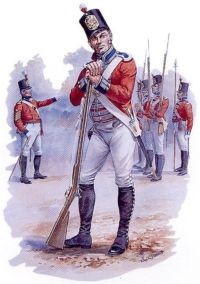
|
On 17th May 1809, Sergeant Joseph Ratcliff transferred to the 8th Royal Veteran Battalion. His service is drawn from musters and paybooks (National Archives).
Joseph served under Colonel J.W. Watson at Fort Cumberland on Portsea Island, where a major reconstruction was in progress; it had begun in 1785 and would not be completed until 1812. The original earthworks were being replaced with a much larger construction in stonework to deter an enemy from landing in Langstone Harbour and threatening Portsmouth Royal Navy Dockyard from the land.
Joseph was rarely present at muster being variously on guard or shipboard duty, including 33 days shipboard from 25th February to 29th March 1810. On 27th September 1810 he embarked for duty in the garrison on Heligoland where he served in Capt. William Dawson's Company with fellow sergeants James Bennett, Robert Smith, William Spencer and Jacob Wintle.
Heligoland was an important staging post for defeating the blockade which the French had placed on British trade with Europe, the so-called Continental System. The 8th Royal Veteran Battalion were part of the 600 strong garrison which defended the island while men-of-war patrolled the surrounding seas. Over 200 merchants and agents had settled on the island by 1808, and by 1809 it was not unusual for several hundred vessels to berth each day.
Joseph's pay as a sergeant was only 1s 10d per day but quite large sums of money were involved in deploying troops. For example, on 5th February 1808, £262 10s (equivalent to about £9000 in today's money) was drawn as an allowance for bar, baggage and forage money for three companies of the 8th Royal Veteran Battalion ordered to embark for Heligoland (Paymaster General). The temptation to divert funds for personal use was ever present and so it was that Paymaster Noah Edward Lewis of the 8th Royal Veteran Battalion was court-martialled at Whitehall on 25th and 28th August 1813 for embezzling and misapplying large sums of public money between 24th December 1807 and 25th August 1812 - 'more or less' £2280 2s 6½d. He was found guilty of £2120 2s 6½d and dismissed from His Majesty's service.(James) The records don't show why he was excused £160.
In Spring 1812 Joseph was on leave in England where he was discharged 'worn out' on 6th June.
- National Archives, General Muster Books and Pay Lists, 8th Royal Veteran Battalion, WO12/11177 (1809-1810), WO12/11178 (1811-1812)
- An account of the extraordinary expences of the army incurred and paid by the Right Honorable the Paymaster General of His Majesty's Forces 25 Dec 1807 - 24 Dec 1808.
- James, Charles, A collection of the charges, opinions and sentences of general court martial, Egerton, London 1820.
|



